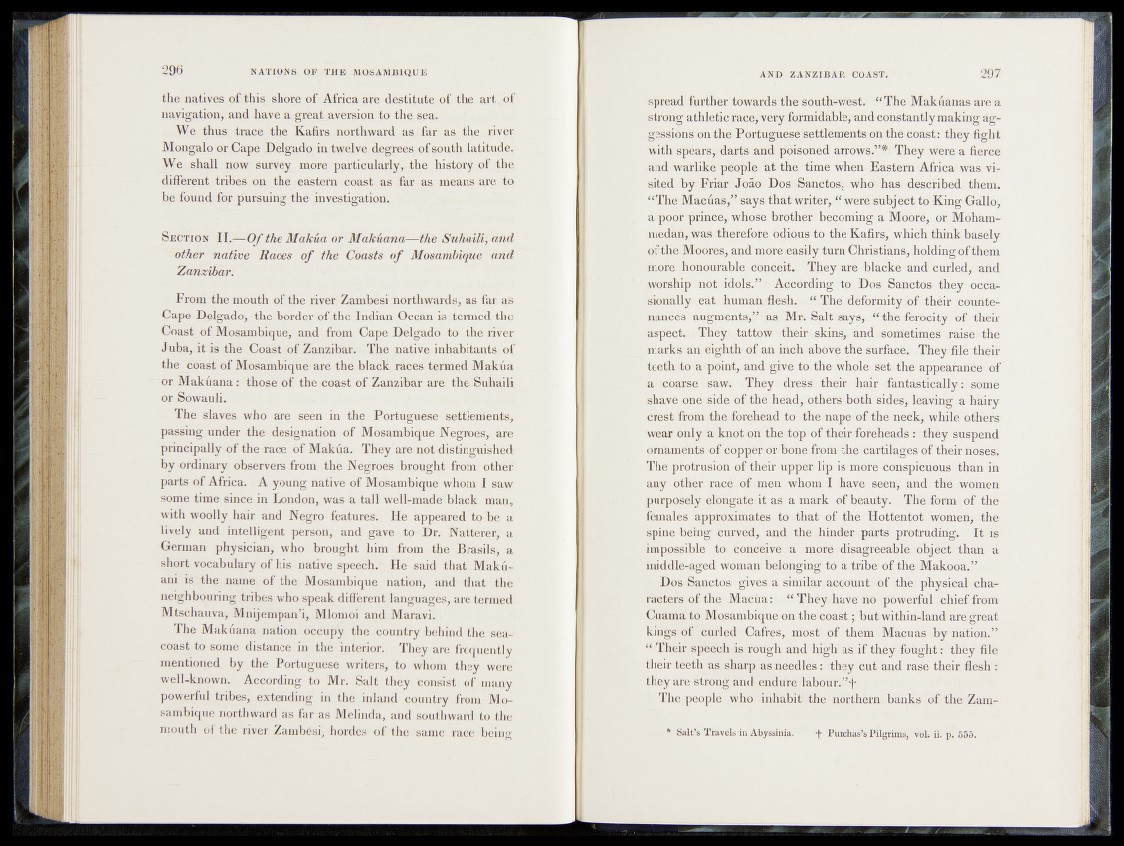
the natives of this shore of Africa are destitute of the art^of
navigation, and have a great aversion to the sea.
We thus trace the Kafirs northward as far as. the river
Mongalo or Cape Delgado in twelve degrees of south latitude.
We shall now survey more particularly, the history of;the
different tribes on the eastern coast as far as means are to
be found for pursuing the investigation.
S e c t io n II.— Of the Makua or Makuana—the Suhaili, and
other native Races of the Coasts of Mosambique and
Zanzibar.
From the mouth of the river Zambesi northwards, as far as
Cape Delgado, the border of the Indian Ocean is termed the
Coast of Mosambique, and from Cape Delgado to the river
Juba, it is the Coast of Zanzibar. The native inhabitants of
the coast of Mosambique are the black races termed Makua
or Makuana: those of the coast of Zanzibar are the Suhaili
or Sowauli.
The slaves who are seen in the Portuguese settlements,
passing under the designation of Mosambique Negroes, are
principally of the race of Makua. They are not distinguished
by ordinary observers from the Negroes brought from other
parts of Africa. A young native of Mosambique whom I saw
some time since in London, was a tall well-made black man,
with woolly hair and Negro features. He appeared to be a
lively and intelligent person, and gave to Dr. Natteref, a
German physician, who brought him from the Brasils, a
short vocabulary of his native speech. He said that Maku-
ani is the name of the Mosambique nation, and that the
neighbouring tribes who speak different languages, are termed
Mtschauva, Mnijempan’i, Mlomoi and Maravi.
The Makuana nation occupy the country behind the sea-
coast to some distance in the interior. They are frequently
mentioned by the Portuguese writers, to whom they were
well-known. According to Mr. Salt they consist of many
powerful tribes, extending in the inland country from Mosambique
northward as far as Melinda, and southward to the
mouth of the river Zambesi, hordes of the same race being
spread further towardMlfieisouth-west-. ' “ The Makuanas are a
strong athfeme raGe/'veB^formidable^and constantly making ag-
gessidns onA^Poftuguefe&.settlements on the^coast: they fight
with-spear's'darts and-poisobfed arrows.”*, They were a fierce
and warlike^people at the time when Eastern Africa was: visited
by Friar Joao1 Dos^Sancto^ who has described them.
“ The Macuas/’ihys that writer, “ were subject to King Gallop
avpqor. prince, wboseybrother aMflbre* or Mohammedan,
was therefore ofiious; to the Kafirs, which think basely
of the Moores, and more^sily turn Christians, hpldingiof them
more honourabl'e'Conceit., ulEhey aEtliblacke and juried,’ - and
Jworship not idols.” According »t,o ^Db's'^anctos they^occa^
sionally eat human flesh. “ The defor-mityitof their cdunte-
augmenfe^^ as Mrij.^lti^ays,^^thHfej^@ii(ty|<^r tMeir
aspect. They tattow their skins, and ^sometim^ raise' the
mark s . art eighth- of an inch faboxf.the .They;file: their
$eefih to a point, and give to the whete set thei appearancWof
a coarse ^saw* They dres^;- their s’bair ^^feastically.:- some
shave, one side of the head, others? both side^®easing a hairy
crest from the forehead to the nape of the neck; -while' others
'wear''only a knot on the top of their foreheads*: they suspend
ornaments pfi Copper or bone. the 'car^^|®^£itheiis bbseSi
The protrusion of their upper lip jjgjfinore conspicuous than in
any other race of men whom I have t seeii?, and the women
purposely elongate it as a mark of beauty. The .form of the
females approximates to that of the Hottentotafwomen,, the
spine being curved, and the hinder parts protruding. It ill
impossible to conceive a more^difugE&bable object than a
middle-aged woman belonging^ to a tribe of the Makooa.,” ,
Dos Sanctos gives bmhiilar, account of the* physical characters
of the Macua: “ They have mo powerful chief from
Cuama to Mosambique on the coast; but within-Iand are great
kings of curled Cafres, most of them Macuas? by nation.”:
“ Their speech is rough and high as.if theyfetight: they file
their teeth as sharp as needles: they- cut and rase their, flesh :■
they are strong and endure 'labour.’’^
- The people who inhabit the northern banks ofthe Zam-
* Salt’s Travels in Abyssinia. -f- Purchas’s Pilgrims, vob il.; jp. S55.